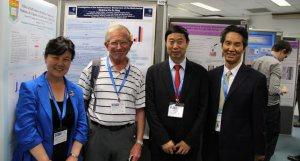AJCN:摄入过多饱和脂肪可致男子**数量下降
人们已经知道心血管疾病和癌症与饱和脂肪的摄入相关。丹麦一项新研究发现,男士摄入的饱和脂肪越多,精子浓度就越低,精子质量也随之下降。这项研究发表在新一期《美国临床营养学杂志》上。
研究人员发现,摄入饱和脂肪的比例与精子浓度、总数“有明显的关联”。饱和脂肪占能量摄入比例小于11.2%的人,平均精子浓度为每毫升5000万,精子总数约为1.63亿。而饱和脂肪占能量摄入比例大于15%的人,平均精子浓度为每毫升4500万个,精子总数为1.28亿。
世卫组织规定,男子的精子浓度超过每毫升1500万才为正常。在这项研究中,摄入脂肪最高的人有18%未达标,而摄入脂肪最低的人群只有13%。平均而言,摄入脂肪最高的人群精子浓度比摄入脂肪最低的人群低38%,精子总数也少41%。
研究报告的首席作者蒂娜·延森指出,这项研究虽未能确定其他生活方式因素是否有影响,但可以解释男子精子数量持续下降的现象。她说,下一步的研究目标是找出饱和脂肪影响精子数量的机制,从而通过减少饱和脂肪摄入来改善男子精子质量。
法国科学家去年研究发现,35岁左右的法国男子的平均精子浓度从1989年的每毫升7400万个减少到2005年的每毫升5000万个,研究人员认为肥胖可能是一个原因。
High dietary intake of saturated fat is associated with reduced semen quality among 701 young Danish men from the general population
Tina K Jensen, Berit L Heitmann, Martin Blomberg Jensen, Thorhallur I Halldorsson, Anna-Maria Andersson, Niels E Skakkeb.k, Ulla N Joensen, Mette P Lauritsen, Peter Christiansen, Christine Dalg.rd, Tina H Lassen, and Niels J.rgensen
Background: Saturated fat intake has been associated with both cardiovascular disease and cancer risk, and a newly published study found an association between saturated fat intake and a lower sperm concentration in infertile men. Objective: The objective was to examine the association between dietary fat intake and semen quality among 701 young Danish men from the general population. Design: In this cross-sectional study, men were recruited when they were examined to determine their fitness for military service from 2008 to 2010. They delivered a semen sample, underwent a physical examination, and answered a questionnaire comprising a quantitative food-frequency questionnaire to assess food and nutrient intakes. Multiple linear regression analyses were performed with semen variables as outcomes and dietary fat intakes as exposure variables, adjusted for confounders. Results: A lower sperm concentration and total sperm count in men with a high intake of saturated fat was found. A significant dose-response association was found, and men in the highest quartile of saturated fat intake had a 38% (95% CI: 0.1%, 61%) lower sperm concentration and a 41% (95% CI: 4%, 64%) lower total sperm count than did men in the lowest quartile. No association between semen quality and intake of other types of fat was found. Conclusions: Our findings are of potentially great public interest, because changes in diet over the past decades may be part of the explanation for the recently reported high frequency of subnormal human sperm counts. A reduction in saturated fat intake may be beneficial for both general and reproductive health.
本站所注明来源为"爱爱医"的文章,版权归作者与本站共同所有,非经授权不得转载。
本站所有转载文章系出于传递更多信息之目的,且明确注明来源和作者,不希望被转载的媒体或个人可与我们
联系zlzs@120.net,我们将立即进行删除处理
热点图文
-
牛津大学:心速宁胶囊作用机制研究成果发表
2015年5月19日,由澳大利亚药理学会和英国药理学会主办的澳-英联合药理...[详细]
-
GM制药Epidiolex获FDA孤儿药资格
2月28日,GW制药宣布美国FDA授予该公司用于治疗儿童Lennox-Ga...[详细]


